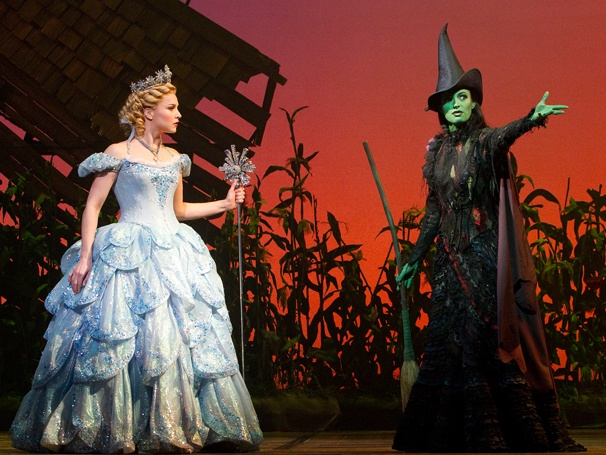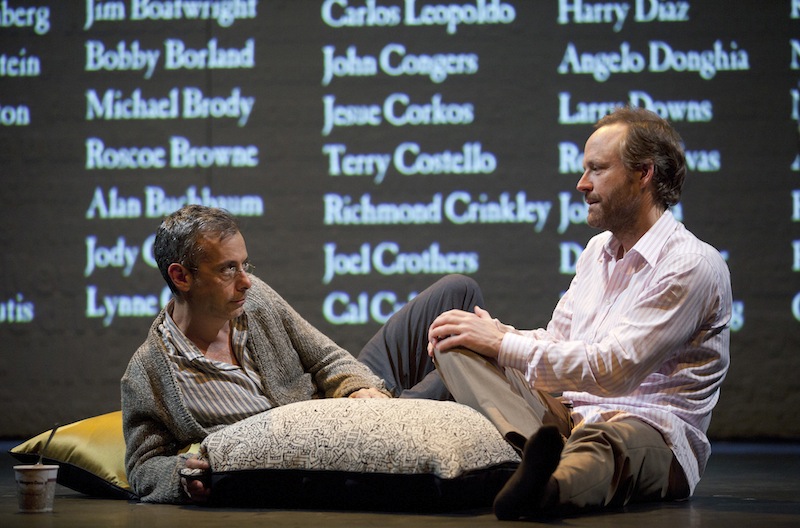 |
| From left to right: Charlie Carver, Andrew Rannells, Tuc Watkins, Jim Parsons, Robin de Jesus, Matt Bomer, and Zachary Quinto in The Boys in the Bands. |
There is a moment in The Boys in the Band, Mart Crowley's groundbreaking 1968 play about a group of gay New Yorkers, where the men dial back their effeminate behavior to avoid upsetting a less-than-accepting party crasher. Watching the star-studded ensemble of openly gay actors subtly modify their body language, mannerisms, and vocal inflections in order to "pass" for straight is both breathtaking in its simplicity and profoundly moving, a wonderfully naturalistic moment that encapsulates everything that is exceptional about Joe Mantello's first rate production. These men - both the characters and the out and proud actors who portray them - are intimately familiar with that particular conflict between being your authentic self and trying desperately not to rock the boat for fear of retribution, and that bubbling undercurrent of internalized homophobia informs every aspect of Crowley's deceptively powerful script.
The premise of The Boys in the Band, like many great dramas before and after it, involves a group of people gathering together, drinking heavily, and proceeding to eviscerate one another while dealing with years of emotional baggage. In this case, the group is a collection of gay men throwing a birthday party for their friend Harold in the opulently appointed apartment of Michael. Initially a joyous if somewhat catty celebration - the men throw shade at one another with pinpoint accuracy thanks to Crowley's caustically funny one liners - things take a dark turn when Michael's possibly closeted college roommate crashes the party and takes offense at the blatantly fay behavior on display. When the mental stress causes a previously sober Michael to fall off the wagon, the claws come out and no one is safe from his unmitigated rage.
It is shocking how immediate and relevant Crowley's script remains a half century after its initial premiere, a fascinating example of both how much and how little has changed about gay culture in the intervening decades. Stonewall, the AIDS crisis, and marriage equality have all seismically altered gay life in America, and yet many of the issues facing the characters in Crowley's play are the same as those that gay men grapple with today. There's the self-loathing that comes from growing up in an environment that states, either implicitly or explicitly, that it would be better if you weren't gay, and the lifelong effect that has on one's ability to connect with other human beings. There's the question of what exactly a loving homosexual relationship should look like: should it mirror the monogamous template favored by heterosexual couples, or is an open arrangement that allows for other sexual partners a viable alternative? Does the constant belittlement gay men experience excuse their tendency to inflict the same kind of taunts on one another, and how is that compounded when discussing queer people of color?
All of these issued are embodied by an impeccably cast ensemble of top tier talent. Jim Parsons is close to a revelation as Michael, the party's host and evening's protagonist. While the play's opening scenes allow the Emmy-winning television star to rely mostly on the skills that have served him so well on The Big Bang Theory, once Michael turns to drink the actor goes into much darker and more surprising territory. The ferocity with which Parsons turns on his supposed friends is astounding, and like the characters in the play you find yourself becoming more and more terrified of the unbridled malice he displays. And when Michael finally crumbles under the weight of what he's done, Parsons bares his soul in a raw and emotionally devastating climax that will leave you stunned speechless.
Two-time Tony-nominee Robin de Jesus also shines as Emory, the most flamboyant and overtly femme member of the group. de Jesus is responsible for many of the evening's biggest belly laughs thanks to his impeccably timed delivery, but it's his gut wrenching monologue about Emory's difficult childhood that leaves the longest lasting impression. Tuc Watkins and Tony-nominee Andrew Rannells bring believable depth and complexity to their fraught onstage relationship as two men with very different ideas of what commitment looks like, a relationship which ends up being one of the more uplifting storylines of the evening. And in a less showy role, Matt Bomer makes a confident Broadway debut as Michael's sometimes-lover and the oft-ignored voice of reason.
Director Joe Mantello has once again worked his magic here, subtly but assuredly guiding his actors' performances so that every bit of stage business further reveals either character or plot. His beautifully understated direction belies the extreme specificity used to usher this work onto the Great White Way - the original production ran for over 1000 performances Off-Broadway, but this is the show's Broadway premiere - amping up the emotion while maintaining the intimacy and even claustrophobia necessary to make the drama really land. Mantello's pacing is first-rate, giving this intermissionless work room to breath without ever letting it drag, and cultivating an ever-growing sense of dread as both the audience and the characters realize they are getting far more than they signed on for. And the way Mantello deploys his actors over David Zinn's spectacularly varied unit set ensures the production is always a joy to look at (Zinn also designed the period-perfect and expertly tailored 1960s costumes).
Given the talent both onstage and behind the scenes, it isn't surprising that The Boys in the Band is one of the hottest tickets of the summer. It isn't even that surprising that the show's Broadway bow is so expertly realized. What is downright remarkable is that in its own way, this small show has as much to say about the gay experience in America as the recently closed and rightfully lauded epic Angels in America. It is a darkly comic drama polished to near perfection, and an absolutely necessary history lesson in gay culture and interpersonal dynamics. If there are still any tickets left for the remainder of The Boys in the Band's limited run, snatch them up quick; this is essential viewing.


